Kayaking the Length of One of Africa’s Great Lakes
I was not prepared.
This in itself was not a surprise – I am rarely prepared for anything.
I had just spent a week in the Democratic Republic of Congo hiking up an active volcano and came away both exhausted and with a noticeably less functioning knee. Now, I was a little way from the Congolese Border, preparing to kayak more than 90km; the length of Lake Kivu, one of Africa’s Great Lakes. I would start in Gisenyi and end in Muhari.
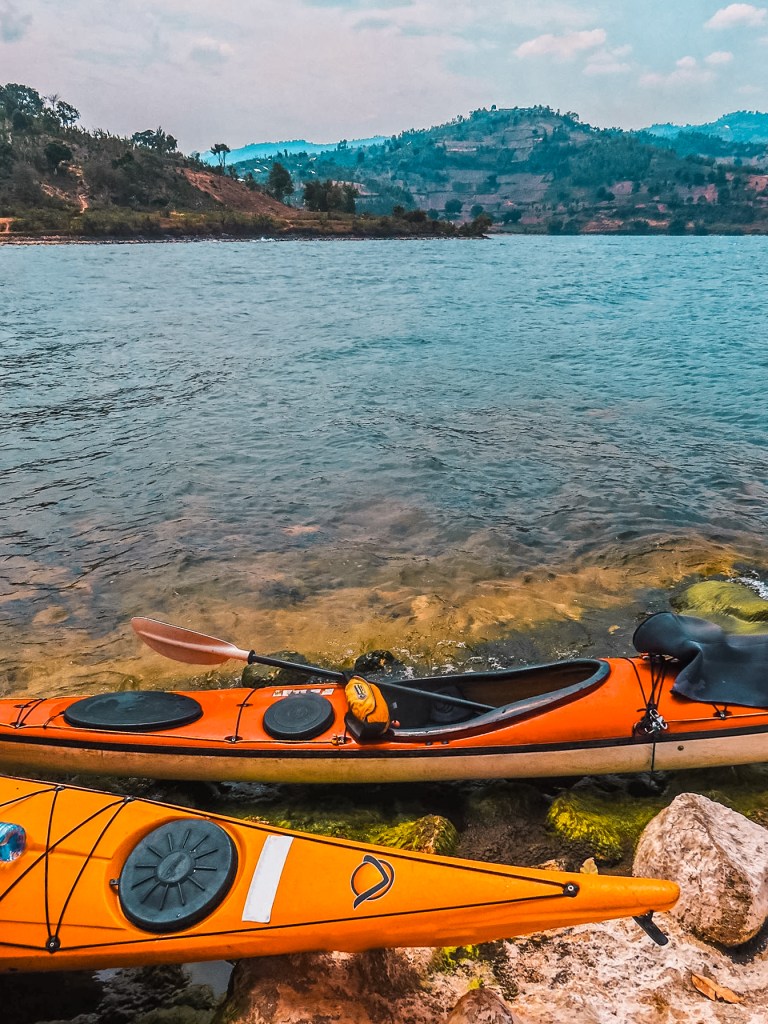
I stood on Kivu’s banks alongside my guide, Francis, as we loaded our kayaks with our kit: tents, food, clothing, and provisions that had to fit into two small boats. Francis did not exactly give them a choice in the matter.
“Did you know,” he began conversationally, as he wrestled an entire stem of bananas into the prow of his kayak. “that Lake Kivu is an exploding lake.”
I paused in my argument with my tent and my own kayak’s stern.
“It’s a what now?”
“An exploding lake. It’s full of methane, and sometimes it explodes and kills all the fish… and the people.”
I stared at him for a long moment, trying to decide whether he was being genuine or just winding me up.
“Is it likely to do that within the next 4 days?”
He looked up at me, grinning. With one triumphant shove, the 30 or so bananas disappeared into his boat.
“Probably not,” he stated. His grin became a smirk.
“Wonderful.”
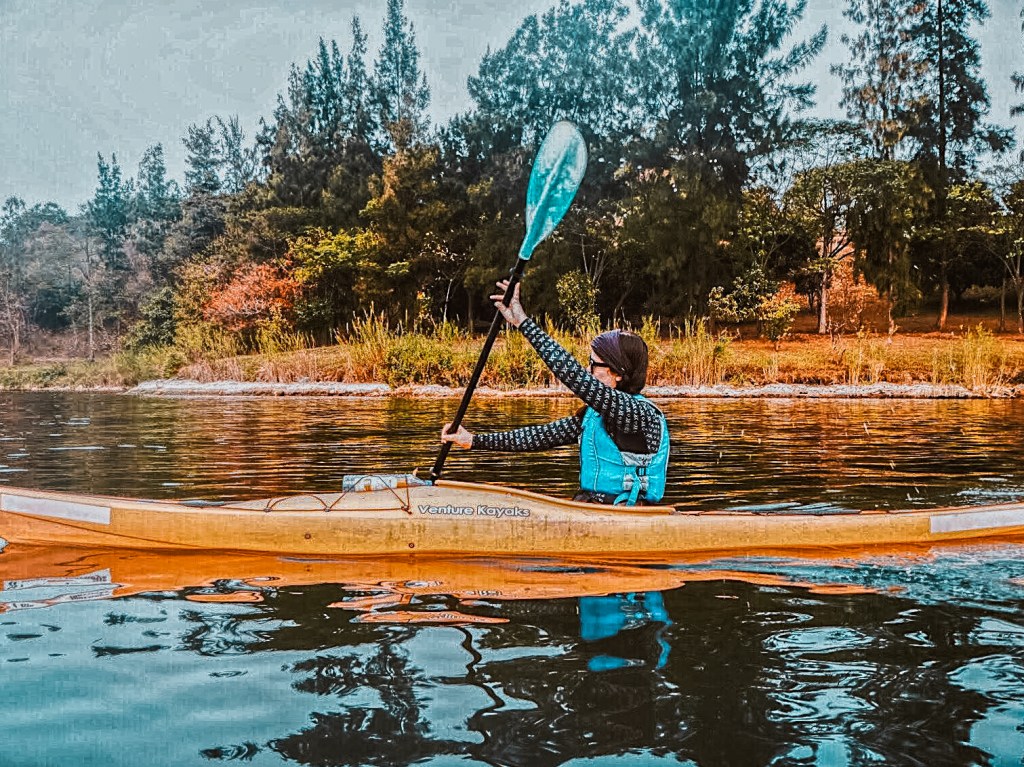
That first day was slow-going. The winds were high and the cresting waves had to be faced head-on, unless you wanted to end up upside-down (which certainly was not on my agenda). I had significant doubts about the weathertightness of the compartment where my clothes were stored. Francis, it seemed to me, was less worried about the waves and more concerned with seeing how many islands he could circle. He would disappear from sight for twenty minutes at a time before miraculously reappearing somewhere to my right. It was also made plain to me, in these moments of his re-apparition, the reason behind the bananas, as their skins piled up on his spray deck.
As the afternoon drew on and we came towards our first campsite, the waves shrank back and we landed easily, dragging our boats onto the shore and unloading the tents. The family who owned the guesthouse nearby gladly offered us freshly caught fish and excellent coffee from the lake’s coffee islands. We settled down to gaze out onto the water. As the light faded, the sky in the distance was pink from the twin volcanic summits of Mt. Nyamuragira and Mt. Nyiragongo. Just a few days before, I had sat drinking not coffee, but tea, admiring the eerily glowing lava.
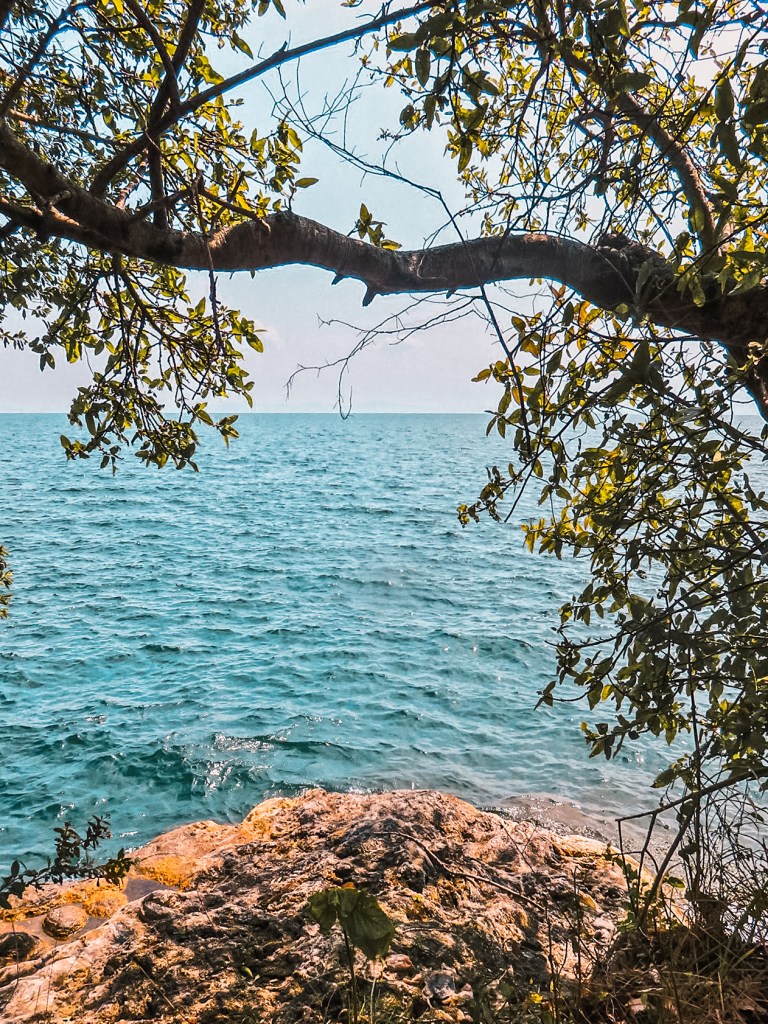
“I was just there.” I told Francis, gesturing to the light in the distance. He glanced from his plate in amusement before mild concern furrowed his brow.
“Congo is dangerous,” he admonished.
“Perhaps,” I agreed, “But people told me the same about Rwanda.”
Our conversation lapsed into silence as the guesthouse owners joined us. The discussion soon turned to families. Francis, it seemed, was getting married and had been visiting his bride-to-be’s relatives.
“Her aunt,” he explained, “The rest died in the genocide.”
It was such an offhand comment and the conversation progressed so quickly that I had almost missed it. The long-reaching shadow of Rwanda’s infamous past; the reason people had told me the country was dangerous based on all the knowledge a particular, hotel-centred, film had offered them. This was the only occasion in my many visits to the beautiful, peaceful, and warm-hearted country of Rwanda that I have ever heard the genocide mentioned in conversation. I have never brought it up.
Sleep was hard to find that night. My thoughts lingered on my charming, wide-smiled guide, and a country with a painful past.
Dawn saw us packing the kayaks and heading off again. It was a calmer day and we made good time to a beachfront near Kibuye. Palm trees surrounded our tents, the water lapping the shore. A small island just in striking distance was a lure – it seemed impossible to resist.
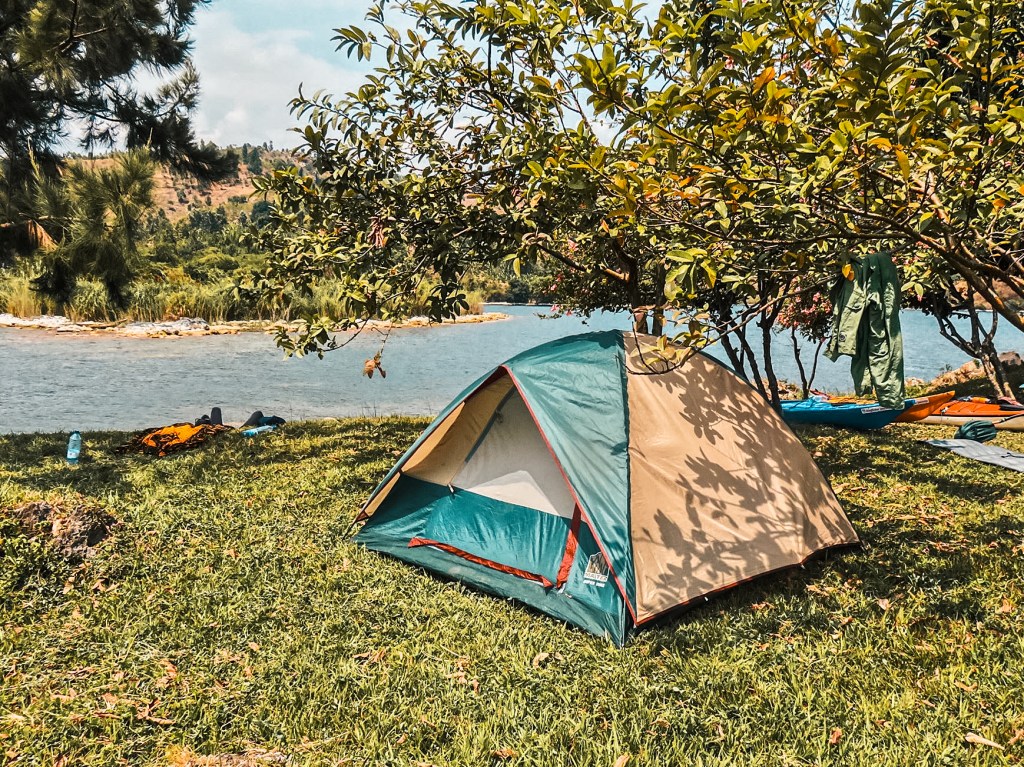
Francis turned and grinned at me as I unzipped my mosquito net and scrambled from my tent. We had known each other for only two days, but I already knew that smile.
I knew that smile would not be good for me.
“We could swim there.” He waved an airy hand towards the island.
I stood up and joined him, mimicking his Peter Pan pose, hands on hips as I regarded our apparent mission for the afternoon.
“How far do you think it is?”
“Not far. Maybe half a mile.”
I shot him a very nasty look. “I definitely told you I am a terrible swimmer.”
“It’s not far.”
He was lying. It was far. A mile, for those who do not know, is approximately 44 lengths of a swimming pool. 2 lengths of a swimming pool is my usual limit. Fortunately, the upsetting extra exercise meant I had no trouble drifting off to sleep.
My thoughts lingered on my charming, wide-smiled guide, and a country with a painful past.
There are many animals you may think of when you picture Africa: lions, elephants, wildebeest, perhaps. What we saw the next morning, however, truly surprised me.
Otters, sleek coated and playing in the small wake cast by our kayaks. It is rare to see otters back home in the UK; the last place I expected to spot them was here in East Africa. It seemed it was a day for wildlife as we took a detour in our route to one of Kivu’s lesser known “Bat Islands”, now on the hunt for the sleeping mammals. As we neared our final night’s resting place, we watched the “water cow boys” swimming their livestock between the smaller islands close to the shore.
Our own deserted island home for the night was, fortunately, free of cows, and stunningly beautiful. We lit a campfire and watched the sparks dance as we pondered what would be our final day on the water. I was tired; I could feel the muscles of my arms protesting even as I stirred the metal pot containing our dinner. Francis’ good humour was undiminished.
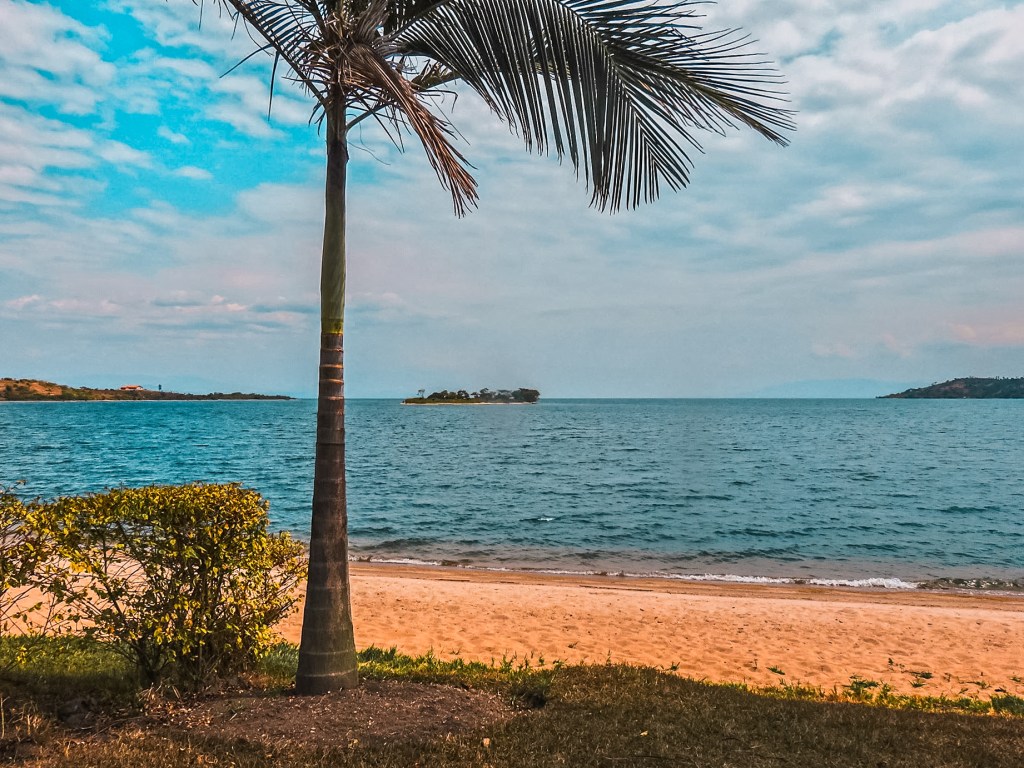
“You should use the toilet.”
“Why?” I drew out the last letter in uncertainty.
“Try it.” He took the spoon from me in expectation.
I duly wandered along the almost-path that had been trod to the bathroom and came upon a wall of woven leaves. My suspicions were heightened. This was, if anything, more luxurious than I had anticipated. As I rounded the wall, I discovered the reason for my guide’s amusement – the hole dug for a toilet was less than thirty centimetres deep. I could hear his call from his seat by the fire.
“More of a ‘Short Drop’ than a ‘Long Drop,’ no?”
He collapsed into laughter and I shook my head, backing away from the “Short Drop”. I’d dig my own toilet, I decided, or I could wait until tomorrow.
Our last day dawned and as the afternoon drew on, we drifted into shore, much lighter on bananas. I mused on the last four days of paddling. It had been physically harder than I had imagined; my arms now ached more than my legs had done. Perhaps that was an improvement. Perhaps not.
Rwanda is a testament to resilience, and my days along the banks of Lake Kivu gave me insight into its warm, friendly, and incredible people.
It had, in a strange way, been emotionally harder too. Rwanda is a remarkable place, with its ban on single-use plastic bags, coming long before much of Europe’s, and a pledge to have all motorcycle taxis to be electric by 2022. It has become something of a pioneer amongst its fellow East African Nations, yet it is also a country with a dark and troubled history – one, which is not just in living memory, but recent memory.
Rwanda is a testament to resilience, and my days along the banks of Lake Kivu gave me insight into its warm, friendly, and incredible people. I can only hope that you also will look past what you may think you know, and give a chance to a country that will give you back far more than you can imagine.
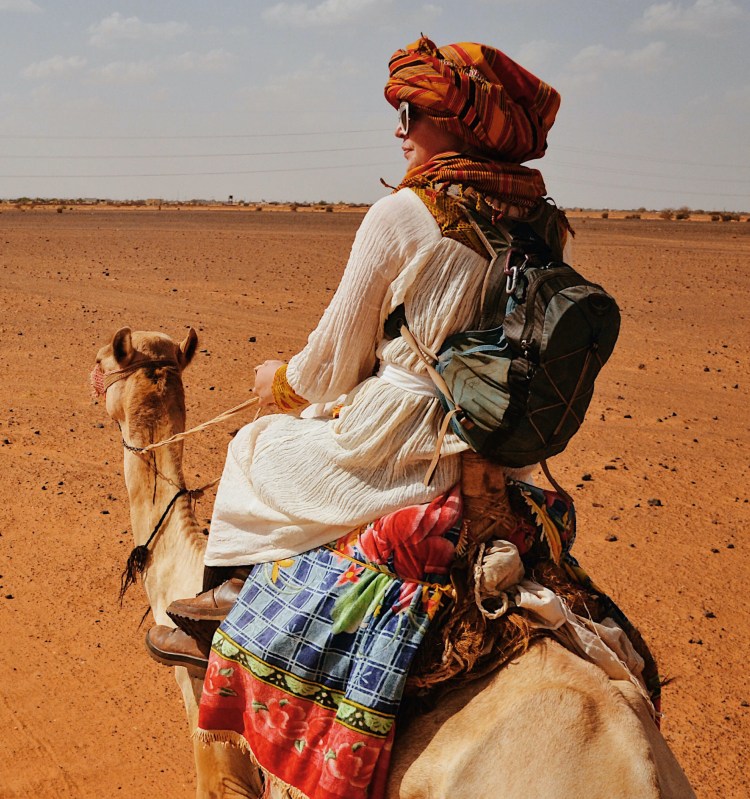
About the Author
Megan grew up in Devon, Southern England, but currently resides in Scotland. She is one half of the adventurous duo ‘Three Wheels Two Legs’ and has spent the last 5 years exploring, journeying through some of the so-called ’most dangerous’ countries on earth. Next year, she will be taking on one of her biggest challenges to date: circumnavigating Sri Lanka and crossing 3000km of India in a three wheeled auto-rickshaw.

A fascinating tale, thanks for sharing your trip and best wishes for many more such adventures.
LikeLiked by 1 person
Thank you! We appreciate all the support.☺️🌍
LikeLike
This is wonderful…engaging…exciting…. Please write more than blog posts…write a while book!
LikeLiked by 1 person
We’d love to! Hopefully in the future we can publish our stories🤞thank you for all the love and support!🙏🌍
LikeLiked by 1 person
Thanks so much! Glad you enjoyed it!
LikeLiked by 2 people
Great story, deserves wider exposure. What a truly marvellous adventure and how well told. Thanks for letting me read this, it’s inspiring.
LikeLiked by 1 person
Thank you! Happy to hear you’ve enjoyed reading our adventurers’ tales ☺️
LikeLike
Fabulous post – really enjoyed it. And yes, it is so important to look behind the headlines wherever we travel.
LikeLiked by 1 person
Of course!! Every country has a deeper tale just waiting to be shared. Always a pleasure to hear you’ve enjoyed our travelers’ tales. 💞
LikeLiked by 1 person
Wow DRC?! Rather you than me. I had a friend from Jordan who got posted to DRC and I’m hoping he came back – he was in the Police. Unfortunately, we’re not still in touch so I don’t know.
Francis sounded a great companion and guide though – rather like a Kenyan cook/porter called Francis who I met on my Mount Kenya trek. All the porters were great fun and great company – we all used to sit around a campfire at night singing songs and telling stories. They were all very jovial and friendly and had great humour.
LikeLiked by 1 person
Interested to hear how your friend is doing – hopefully everything turned out fine and well for him.
And that’s pretty cool! It’s fun to see how everyone’s stories can relate in certain unique ways 😊
LikeLike
I’d love to know how he got on – I hope he got back to his wife and family. I stopped going to Jordan shortly after that though and we lost touch…
LikeLike
Unbelievably great post. Seeing Africa and kayaking one of it’s lake has to be a wonderful experience. Thank you for sharing your adventure in words and photos with us.
LikeLiked by 2 people
Thank you ☺️
LikeLiked by 1 person
I am deeply impressed and mildly envious! If you have read my blogs on Lake Malawi you’ll know why. I love this adventure you had. I am not a strong swimmer and I remember being dropped off by a yacht we were sailing (in Langebaan lagoon, South Africa) and we were supposed to swim to shore, it was much further than I thought. What I learnt was that it’s useful to be able to float when tired, and slowly slowly you get there. It was an enjoyable read.
LikeLiked by 1 person
I just read your story about Lake Malawi and what an amazing tale to tell! It’s beautiful how the journey and people involved are what make the adventure. We appreciate the read and support 🤗
LikeLike
Thank you.
LikeLike